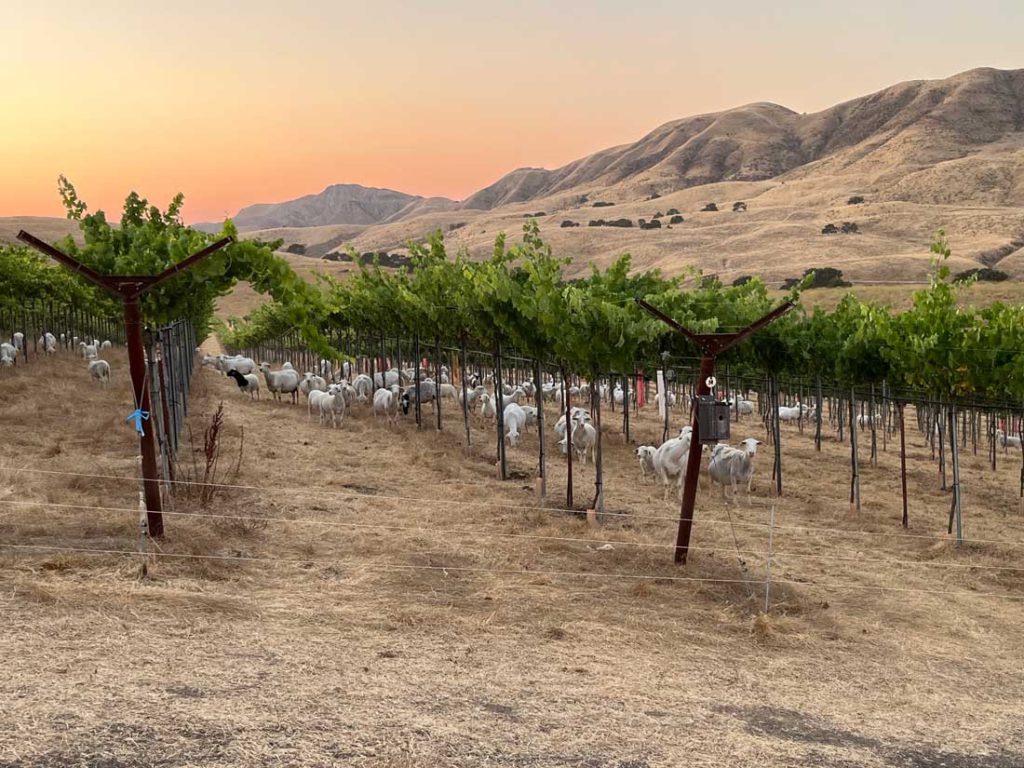
As vineyard manager at the 7,000-acre Paicines Ranch in San Benito County, Kelly Mulville has a rather significant task: he’s trying to practice organic, regenerative farming on 25 acres of vines while surrounded by hundreds of acres of vineyards being conventionally farmed.
“Our underlying philosophy is to allow, enable and support nature to flourish,” says Mulville, a longtime practitioner of holistic farming.
Adds Mulville, who came to Paicines Ranch in 2013, “We are trying to better understand our relationship with the natural world. It’s a constant balancing act.”
Conventional farming takes the approach of “how do we control the landscape to give us what we want?” While regenerative farming seeks to work with nature instead of at cross purposes, the end game is to do so in an economically viable manner.
That’s the challenge.
Working at Paicines Ranch, which has 300 acres of row crops and 7,000 acres of rangeland which support cattle, turkeys, pigs and sheep, is the fulfilment of a dream he’s long pursued—a dream that involves growing both grapes and produce.
Mulville has more than 25 years of viticulture experience in Arizona, California, New Zealand, Spain and Australia, and for a time farmed produce on the high plains of Colorado. His life trajectory changed when he met Sallie Calhoun, owner and manager of Paicines Ranch, who was looking for someone to help restore the ecosystem there.
As founder of the NoRegrets Initiative, Calhoun, who spent her early career in high tech as an engineer and co-founder of Globetrotter Software, her focus is on restoring soil health while sequestering carbon to mitigate climate change.
Calhoun and Matt Christiano acquired Paicines Ranch in 2001, when a proposed housing development for the former cattle ranch fell through. A longtime fan of native perennial grasses, Calhoun began reintroducing these grasses and developing a sustainable grazing program. She quickly recognized in Mulville the perfect person to install an organic vineyard as part of her vision for the ranch.
Most vineyards are farmed as a monoculture, devoid of vegetation save for vines. In contrast, the vineyard at Paicines Ranch is a polyculture that sports a partial overhead trellis system that allows sheep to graze among the vines throughout the year.

Most vineyards in the U.S. only allow sheep to graze on cover crops in the early spring before the vines bud out, as the tender shoots are too tempting for them to ignore. But Mulville wanted these wooly weed eaters to be able to graze in the vines all summer long, adding their fertilizer to the soil while aerating it with their hooves.
Mulville says the high fruit zone trellising also provides more shade from the canopy.
“It’s better for frost protection and mitigating heat, and it’s less expensive to install than conventional systems. If you go to Europe, particularly in Italy and Spain, many of the older vineyards are using higher trellising systems. It wasn’t just about a monoculture. They probably had chickens, pigs, goats and sheep way back then,” he said.
The benefits are many: having sheep doing the work eliminates the need for tillage and mowing between rows; as well as herbicides, suckering and hand weeding beneath the vines. Even more importantly, it improves soil health and encourages a diversity of plants, insects and birds. The results are measurable.
“We had an entomologist from UC Santa Cruz study our soils compared to neighboring conventional vineyards, and he says we are on the right path in a significant way,” Mulville said. “We are leading to the outcome we want and so are they. While theirs is financial, our goals are broader. We have observed a huge increase in insects and birds. We are part of a UC Davis study on regenerative vineyard farming versus conventional.”
For Calhoun and Mulville, soil health is the underlying tenet of this grand experiment. When Mulville surveyed the land before installing the first vineyard, they had 11 species of plants on the site.
“We are at well over 100 species now,” Mulville said. “Some we introduced and some came in on their own. Before we planted the vineyard, we used cover crops to add nutrients, and now we don’t even need it. The ecosystem put itself in a good position to support the vineyard, and all the birds brought in seeds and helped establish the current plant community.”
All those birds have, in turn, attracted birders, who flock to the ranch to observe, learn and become part of the larger ecosystem themselves. That’s the whole goal of the Ranch: to restore, renew and educate.
In fact, on July 17, they are offering a half day regenerative workshop called Grazing in the Vineyards, from 9am-noon.
The ranch has regularly scheduled yoga classes and offers retreats with lodging and meal plans. Lunch, open to the public, is served most Thursdays from 11:30am-1:30pm at The Overlook, and tickets must be purchased by noon the day before. Paicines Ranch also offers an online store for purchasing pasture-raised lamb, beef, pork and turkey, along with heat-and-serve meals and merchandise.
As for the vineyard, the organically grown 17 varieties of grapes, including Assyrtiko, Fiano and Grenache Gris, have attracted a cadre of pioneering winemakers, including many women who are making Paicines Ranch Vineyard designated wines.
Mulville says he is currently working with nine vintners, including Margins, Terah Wines, Miguel Lepe Cellars, James Jelks, Stirm and Camins 2 Dream—the only label in California made by a Native American (Chumash) female winemaker.
“We interview all the people who make wine from here,” says Mulville, “We have to be on the same page. We want them to tell the story of what we are doing here.”
A winemaker dinner is planned for Dec. 6. Mulville muses that they could feature five different versions of Grenache. Now that’s diversity you can taste and appreciate.
Learn more about Paicines Ranch by visiting their website at paicinesranch.com/.














